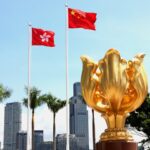With three weeks to go before the opening of the 2022 Olympic and Paralympic Winter Games, the hosting Beijing Municipality government released details on traffic management measures during the Winter Games, advocating for green and low-carbon travel, and calling for precedence to be given to Olympic traffic.
Wu Shijiang, an official from Beijing’s transportation authority said at a Friday press briefing that drew on the experience of previous Olympic Games, Beijing is ready to set up a transport service period for the Winter Games from January 21 to March 16, 2022, a total of 55 days.
Measures during the 55 days include setting up an Olympic lane, prohibiting vehicles carrying dangerous chemical materials, construction waste from driving on the road.
Besides, people in Beijing are encouraged to work from home and adopt flexible working schedules to reduce commuting and relieve traffic pressure on the surrounding areas of Olympic venues.
Wu said that Olympic-related traffic is basically site-to-site, so an Olympic lane is necessary to ensure smooth traffic flow. However, an Olympics-related traffic is mainly concentrated in the north and west of the city, traffic congestion is expected to occur at some times and on some specific road sectors.
Therefore, the city will advocate for green and low-carbon travel, prioritize public transport, and comply with regulations governing Olympic lanes and give precedence to Olympic traffic. Wu said Beijing’s subway and bus services will extend operating hours and may open additional routes depending on the situation to ensure residents’ travel during the Spring Festival holidays, which overlap the Olympics.
Beijing’s Olympic lane will officially open on January 21, covering 239.5 kilometers. During the Winter Paralympics, the length of Olympic lanes will be adjusted to 196.7 kilometers. According to Beijing transportation authority, the owners of social vehicles found illegally occupying the Olympic lane after it is put into use will be fined 200 yuan ($31.5) each violation.
Transportation infrastructure for the Beijing Winter Olympic Games has been put into use, with 16 temporary transport stations and nine hydrogenation stations completed, the Ministry of Transport said at a press conference on December 24.
Wang Limei, vice president of the China Road Transport Association, told the Global Times on Friday that Beijing has struck a good balance between residents’ car traffic and Olympic car traffic.
On January 9, the Beijing transportation authority reminded residents that they should avoid coming into direct contact with vehicles and occupants and wait for professional personnel to attend the scene if they have a traffic accident with Olympic-related vehicles, to protect the closed-loop management situation and avoid possible infection.
Compared with foreign media hype about Beijing’s measure as “rigid,” the expert said maintaining such a balance requires a lot of human and material resources, and these efforts should not be ignored. She noted that Beijing’s pre-management of traffic during the Games are “nanny-like.”
She said that traffic management amid the 2022 Winter Games will be simpler, more efficient than during the 2008 Beijing Summer Olympics, when many blocks were closed to traffic, which was even heavier in 2008 because of the huge number of spectators.
The emblem of Beijing 2022 Olympic Winter Games. (Photo: Xinhua)



